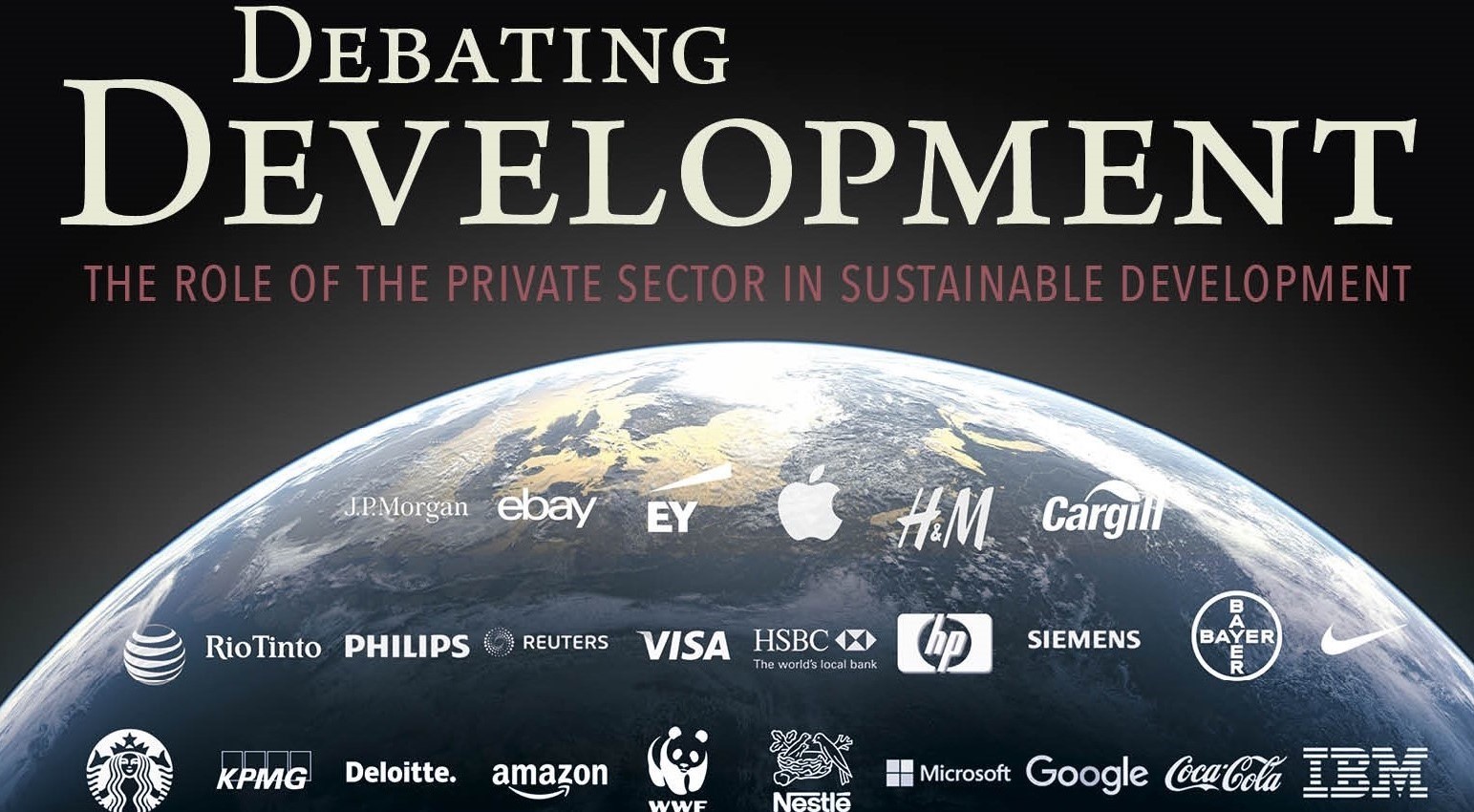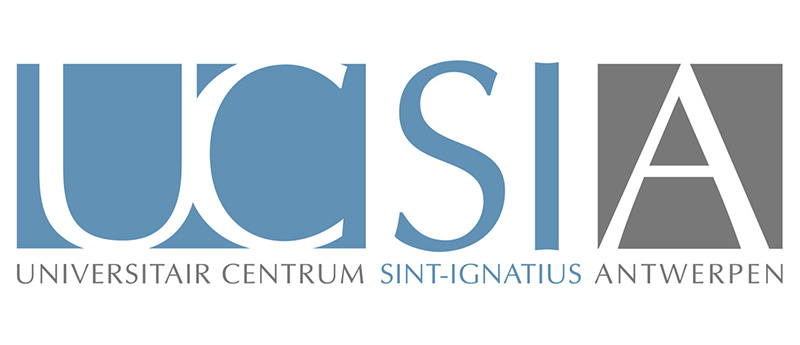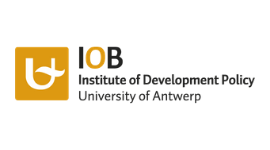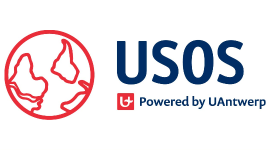
CORPORATE SOCIAL RESPONSIBILITY AND BUSINESS ETHICS
The first session of this year’s Debating Development Series, devoted to the topic of ‘The Role of the Private Sector in Sustainable Development’, an initiative of the Institute of Development Policy and the University Foundation for Development Cooperation of the University of Antwerp, was supported by UCSIA. Over 150 people, half of them students who follow the series as an optional course, attended this session on Corporate Social Responsibility and Business Ethics with guest speakers Céline LOUCHE of the Audencia Management School of Nantes and Luc VAN LIEDEKERKE of the Centre for Ethics of the University of Antwerp.
Report
CSR and RI: Tools to Transition towards Sustainability (Céline Louche)
Corporate Social Responsibility CSR) & Responsible Investment (RI) are tools for a transition towards a more sustainable society in light of goals set by the UN’s Sustainable Development Goals (SDG’s). The ambitious targets necessitate implication of the business sector, as UN Secretary-General Kofi Annan has recognized when calling for a mobilization of the corporate sector to contribute in terms of management, finance and technology.
Céline Louche’s argmentation pertained to RI as incentive for CSR to reorient capital flows towards sustainable economic models.
Whereas the European Union used to define CSR in broad terms as the business contribution to sustainable development, the responsibility of the sector for their impacts on society gained preeminence. CSR is thus no longer an ‘add-on’ (or additional cost) to business as usual, but becomes embedded in the company’s structure, strategy and decision-making process (as a value). Pursuing sustainability even procures advantages in terms of opening up new markets and marketing a green imago. Surveys indicate that over two thirds of companies recognize the competitive advantage of CSR and most companies are convinced that CSR reporting stimulates their awareness for societal accountability. This indicates a shift in focus from shareholder (priority of profit) to stakeholder (attention for accountability).
RI is defined as the practice of creating economic and societal value through financial models, products and markets that are sustainable over time. It is geared towards value creation in the long run, from avoidance of risk to avoidance of unacceptable behavior and promotion of fairness and justice. The RI asset market has exploded in the last two years with an increase by a third to reach 35 trillion dollars. Europe’s share is 14 trillion dollars compared to 12 trillion for the US. The UN has drawn up a memorandum with Principles for Responsible Investment which has been subscribed to by 2372 signatories to date, which proves that RI is not a niche market anymore. They as such engage themselves to incorporate environmental, social and governance issues into their investment decisions and make this transparent. This stance should be adopted by all actors involved in the system, from deposit holders, over institutional investors, such as pension and insurance funds and asset managers such as banks, up to data providers and advisory agencies.
RI strategies encourage CSR by excluding negative products (‘sin stocks’ such as weapons), production processes (such as pollution or child labour) and precautionary issues (cf. risky new technologies), benchmarking through evaluation of performance (e.g. FTSE Russell ESG Rating) and shareholder engagement through public (and private) dialogue.
To move capital flows in the right direction RI uses various strategies from inclusion over impact investing to alternative forms of investment.
Inclusion refers to targeted (thematic) investment in e.g. renewable energy, sustainable transport, waste management. The European Green Funds market witnesses a 50% growth rate and exceeded 30 billion euro in 2017. Impact investment consists in deliberate investment for social return as in philanthropy and development aid. Today we witness a real social impact revolution thanks to a new generation of social entrepreneurs.
Alternative investment modes imply changes in governance and decentralization of infrastructure, allowing for indirect investment, only to be paid out if the envisaged social impact targets are attained. Social Impact Bonds have as such been devised as a financing mechanism shared between private and public institutions and social innovators commonly bound to the realization of social objectives. Crowdfunding, based on small amounts of capital from a large number of individuals to finance a business venture, is another case in practice.
Via these strategies RI redirects investment to certain sectors and activities by emphasizing the importance of societal impact and by allowing more people, through accessible financial services, to invest in innovative projects.
To end on a critical note, Louche enumerates some shortcomings pertaining to quality of assessment, depth of transparency, oversimplification of complex problems, limits to mindset based on profit maximization, overstretched expectations. Not all social problems can be transformed into business opportunities.
Shared Value Creation? The Role of Business in Society? (Luc Van Liedekerke)
Luc Van Liedekerke confirms that RI does succeed in pushing the business sector in the right direction. From personal experience he can testify of the increase in attention for sustainability issues. Whereas he was about the only professor in Belgium specializing in this subject matter at the beginning of the eighties, he is now involved in devising sustainability standards on request of the Belgian Federation of the financial sector, FEBELFIN.
He continues with a historical note on the interaction between business and society. Under the influence of capitalism the role of the business sector changed dramatically. The Anglo-Saxon tradition with emphasis on private property, resulted in large autonomous companies with limited societal responsibility. By the end of the 19th century large companies start to emerge and invoke public reaction. In the US Theodore Roosevelt reacted against ‘robber barons’ and introduced anti-monopoly legislation. In Europe Walther Rathenau of AEG, who became minister of foreign affairs, stated that managers of private corporations should act like public officials, in the interest of the company and the country and that they are equally accountable to the public. The Catholic social tradition also promoted the idea of public-private relationship, which paved the way for the nationalization of large industries after World War II to sustain the reconstruction of the country. In the seventies and eighties economic liberalization, following the Anglo-Saxon model, becomes the rule, culminating in the privatization of communist countries. This leads to a backlash with economist Richard Freeman calling for a revision of business-state relations as early as 1984 and introducing the notion of stakeholder management.
This brings us to the notion of Corporate Shared Value which endorses the idea that business interests and societal interests are compatible. But the problem is that we cannot make abstraction of the capitalist playing field. We can invent new products and open up new markets but the modes of production are harder to adjust. We are slowly making progress in developing new modes of investment, in between the extremes of traditional development assistance and commercial investing, such as socially responsible investment and impact investment.
Speakers

Céline Louche
Professor Business & Society at the Audencia Management School in Nantes, France and guest lecturer at the Waikato University in Hamilton, New Zealand

Luc Van Liedekerke
Professor Business Ethics at the Centre for Ethics of the University of Antwerp

Cassandra Vet
Assistant at the Institute for Development Policy (IOB) at the University of Antwerp
Debating Development Lecture Series
Illicit Financial Flows
29 October 2019
Sol Picciotto, Atul K. Shah
& Cassandra Vet
Philanthropy
5 November 2019
Linsey McGoey, Sara Kinsbergen
& Gert Van Hecken
Securitization & Conservation
12 November 2019
Rosaleen Duffy, Christine Lain
& Ivan Ashaba
Mining in Africa
26 November 2019
Tomas Frederiksen, Piet Wostyn
& Sara Geenen
Degrowth - Green Growth
10 December 2019
Julia Steinberger, Brent Bleys
& Gert Van Hecken
How to participate?
Participation is free.
Please register online.
In cooperation with:

UCSIA
Koningstraat 2
B-2000 Antwerpen
info@ucsia.be
Tel. +32 (0)3 265 49 60
Voorlopige locatie tijdens de renovatiewerken:
Blindestraat 14, 2000 Antwerpen






